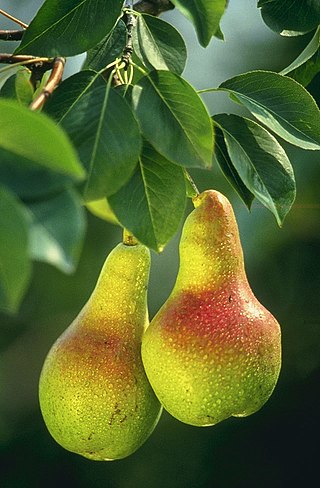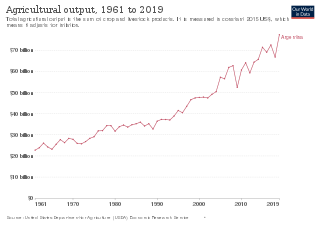Related Research Articles

Pears are fruits produced and consumed around the world, growing on a tree and harvested in late summer into mid-autumn. The pear tree and shrub are a species of genus Pyrus, in the family Rosaceae, bearing the pomaceous fruit of the same name. Several species of pears are valued for their edible fruit and juices, while others are cultivated as trees.

Shepherd Neame is an English independent brewery which has been based in the market town of Faversham, Kent, for over 300 years. While 1698 is the brewery's official established date, town records show that commercial brewing has occurred on the site since 1573. Since the brewery's formation in the 16th century, ownership has passed in unbroken succession through five families. The brewery produces a range of cask ales and filtered beers. Production is around 180,000 brewers' barrels a year. It has 303 pubs and hotels in South East England, predominantly in Kent and London. The company exports to 44 countries, including India, Sweden, Italy, Brazil, and Canada.
Perry or pear cider is an alcoholic beverage made from fermented pears, traditionally in England ; parts of South Wales; France ; Canada; Australia; and New Zealand. There is growing interest in artisanal perry production in the fruit-growing regions of the northwest United States.

The avocado, alligator pear or avocado pear is an evergreen tree in the laurel family (Lauraceae). It is native to the Americas and was first domesticated in Mesoamerica more than 5,000 years ago. It was prized for its large and unusually oily fruit. The tree likely originated in the highlands bridging south-central Mexico and Guatemala. Avocado trees have a native growth range from Mexico to Costa Rica. Its fruit, sometimes also referred to as an alligator pear or avocado pear, is botanically a large berry containing a single large seed. Sequencing of its genome showed that the evolution of avocados was shaped by polyploidy events and that commercial varieties have a hybrid origin. Avocado trees are partly self-pollinating, and are often propagated through grafting to maintain consistent fruit output. Avocados are presently cultivated in the tropical and Mediterranean climates of many countries. Mexico is the world's leading producer of avocados as of 2020, supplying nearly 30% of the global harvest in that year.

H P Bulmer Limited, trading as Bulmers, is a cider-making company founded in 1887 in Hereford, England.
Bulmers cider is one of a number of brands owned by British cider maker H. P. Bulmer of Hereford, a Heineken subsidiary. It is one of the biggest selling British bottled cider brands in the UK with a number of variants including Bulmers Original & Pear. It should not be confused with Bulmers Irish Cider, sold outside the Republic of Ireland as Magners.

Red Delicious is a type of apple with a red exterior and sweet taste that was first recognized in Madison County, Iowa, in 1872. Today, the name Red Delicious comprises more than 50 cultivars. It was the most produced cultivar in the United States from 1968 to 2018, when it was surpassed by Gala.
The economic geography of the United Kingdom reflects its high position in the current economic league tables, as well as reflecting its long history as a trading nation and as an imperial power. This in turn was built on exploitation of natural resources such as coal and iron ore.

The United Kingdom is a major consumer of wine, although a minor grower and producer. Wine production in the UK has historically been perceived as less than ideal due to the cool climate, but warmer summers and grapes adapted to these conditions have played a role in increasing investment and sale of wines. Most is English sparkling wine, from vineyards across Southern England. Vineyards are becoming common in counties such as Essex, Sussex and Kent, where more varieties of wine can be produced due to the drier and warmer climate.

Agriculture is one of the bases of Argentina's economy.

Mining in Iran is still under development, yet the country is one of the most important mineral producers in the world, ranked among 15 major mineral-rich countries, holding some 68 types of minerals, 37 billion tonnes of proven reserves and more than 57 billion tonnes of potential reserves worth $770 billion in 2014. Mineral production contributes only 0.6 percent to the country's GDP. Add other mining-related industries and this figure increases to just four percent (2005). Many factors have contributed to this, namely lack of suitable infrastructure, legal barriers, exploration difficulties, and government control.

Agriculture is one of the main industries in Taiwan. It contributes to the food security, rural development and conservation of Taiwan. Around 24% of Taiwan's land is used for farming.

Cider is an alcoholic beverage made from the fermented juice of apples. Cider is widely available in the United Kingdom and Ireland. The UK has the world's highest per capita consumption, as well as the largest cider-producing companies. Ciders from the South West of England are generally higher in alcoholic content. Cider is also popular in many Commonwealth countries, such as India, South Africa, Canada, Australia, New Zealand, and New England. As well as the UK and its former colonies, cider is popular in Portugal, France, Friuli, and northern Spain. Germany also has its own types of cider with Rhineland-Palatinate and Hesse producing a particularly tart version known as Apfelwein. In the U.S. and Canada, varieties of alcoholic cider are often called hard cider to distinguish it from non-alcoholic apple cider or "sweet cider", also made from apples. In Canada, cider cannot contain less than 2.5% or over 13% absolute alcohol by volume.

In New Zealand, agriculture is the largest sector of the tradable economy. The country exported NZ$46.4 billion worth of agricultural products in the 12 months to June 2019, 79.6% of the country's total exported goods. The agriculture, forestry and fisheries sector directly contributed $12.653 billion of the national GDP in the 12 months to September 2020, and employed 143,000 people, 5.9% of New Zealand's workforce, as of the 2018 census.

Mining in the United Kingdom produces a wide variety of fossil fuels, metals, and industrial minerals due to its complex geology. In 2013, there were over 2,000 active mines, quarries, and offshore drilling sites on the continental land mass of the United Kingdom producing £34bn of minerals and employing 36,000 people.

Agriculture in South Africa contributes around 5% of formal employment, relatively low compared to other parts of Africa and the number is still decreasing, as well as providing work for casual laborers and contributing around 2.6 percent of GDP for the nation. Due to the aridity of the land, only 13.5 percent can be used for crop production, and only 3 percent is considered high potential land.

The United Kingdom's National Fruit Collection is one of the largest collections of fruit trees and plants in the world. Over 2,040 varieties of apple, 502 of pear, 350 of plum, 322 of cherry and smaller collections of bush fruits, nuts and grapes are grown, in 150 acres (61 ha) of orchards.
Cider in the United Kingdom is widely available at pubs, off licences, and shops. It has been made in regions of the country where cider apples were grown since Roman times; in those regions it is intertwined with local culture, particularly in the West Country.

In the United States, the definition of cider is broader than in Europe. There are two types: one is the traditional fermented product, called hard cider, and the second is sweet or soft cider. However, in some regions, cider is the alcoholic version, whether made from apples or pears, and apple cider is the non-alcoholic version.

Unilever Gloucester is a large food manufacturing site in the north-east of Gloucester, England, that produces all of the makes of Unilever ice cream for the UK.